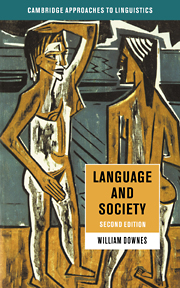Book contents
- Frontmatter
- Contents
- Acknowledgements
- 1 Linguistics and sociolinguistics
- 2 A tapestry in space and time
- 3 Language varieties: processes and problems
- 4 Discovering the structure in variation
- 5 Rhoticity
- 6 At the intersection of social factors
- 7 Change, meaning and acts of identity
- 8 The discourse of social life
- 9 Communication: words and world
- 10 Action and critique
- 11 Language and social explanation
- Further reading
- References
- Index
3 - Language varieties: processes and problems
Published online by Cambridge University Press: 05 June 2012
- Frontmatter
- Contents
- Acknowledgements
- 1 Linguistics and sociolinguistics
- 2 A tapestry in space and time
- 3 Language varieties: processes and problems
- 4 Discovering the structure in variation
- 5 Rhoticity
- 6 At the intersection of social factors
- 7 Change, meaning and acts of identity
- 8 The discourse of social life
- 9 Communication: words and world
- 10 Action and critique
- 11 Language and social explanation
- Further reading
- References
- Index
Summary
Grand port of navigations, multiple
The lexicons uncargo'd at your quays,
Sonnant though strange to me; but chiefest, I,
Auditor of your music, cherish the
Joined double-melodied vocabulaire
Where English vocable and roll Ecossic,
Mollified by the parle of French
Bilinguefact your air!
From ‘Montreal’ by A. M. Klein (1948)Let us now look at some of the differing ways in which linguistic varieties occur in speech communities, beginning with some large-scale variation and then working our way down to differences which occur on a smaller scale.
We will begin with societal bilingualism, the situation in which two or more distinct languages form the repertoire of a community. To explore the complex issues involved in a bilingual society it is interesting to look at one such situation in real historical and political depth. For this Canada will serve as a case study. (For general surveys, see the Further Reading.) We will then turn to those cases in which the society recognizes and names two distinct varieties of the same language as the repertoire, and speakers with more than one variety at their disposal switch or fluctuate between the alternatives. This leads us to the problem of relating the larger social pattern of the varieties to what individuals actually do in specific situations; and, even thornier, the problem of the actual linguistic relationship between varieties which people perceive as linguistically distinct.
Information
- Type
- Chapter
- Information
- Language and Society , pp. 46 - 92Publisher: Cambridge University PressPrint publication year: 1998
